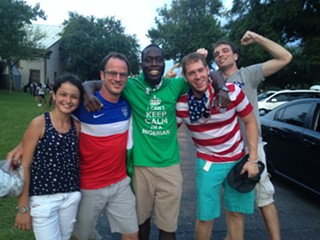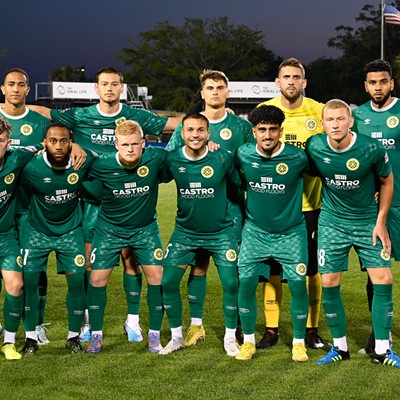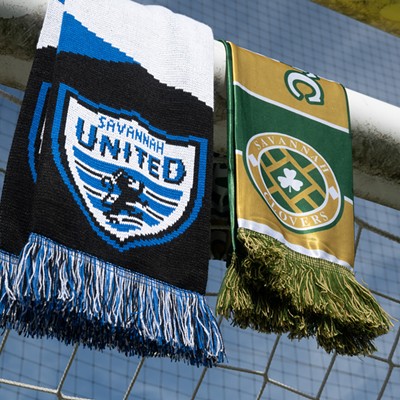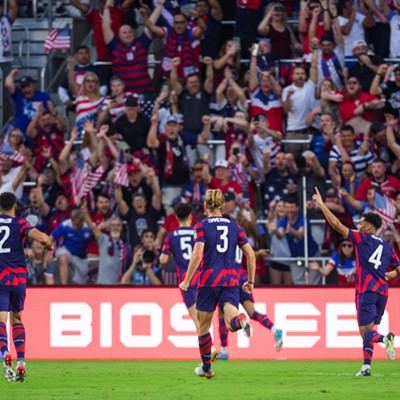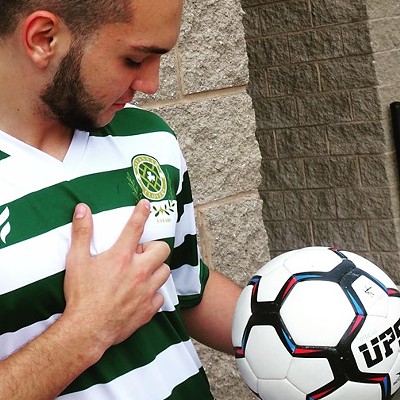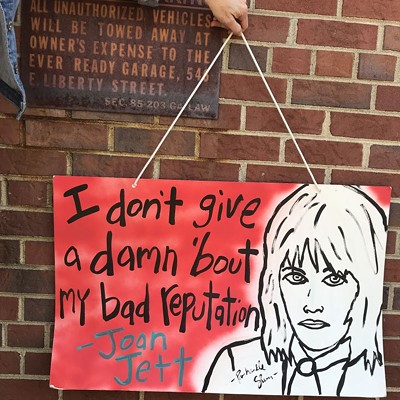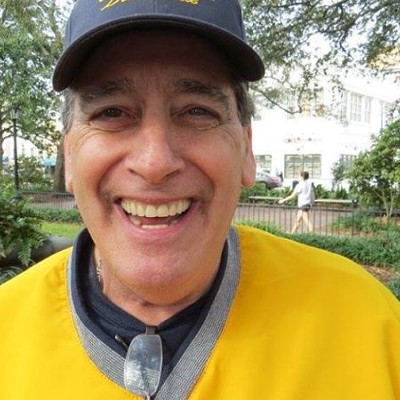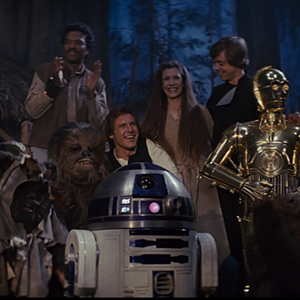WHEN MY husband burst in hollering that he'd scored tickets for the friendly USA vs. Nigeria Men's Soccer World Cup send-off match in Jacksonville, the family reacted pretty much like you'd expect: We took turns running around the kitchen table screaming "Gooooaaaaalllllll" until someone pretended to have a leg cramp and lay on the floor writhing dramatically.
Even after I found out how much we paid for those precious seats, I still rallied. “Well, we really didn’t need to buy groceries this week anyway,” I said briskly, preparing to make dinner out of three eggs and the last of the yard chard.
We wouldn’t be the first people to lose their minds in the name of soccer—or as they say everywhere but here, “the fútbol”—and judging from practically every sports bar marquée and Facebook update, there are more of us every day. The quadrennial cultural disease known as World Cup fever has descended upon the planet, and America has never been so gleefully infected.
Sure, we’re used to our teams competing internationally in multiple sports at the Olympics, but there’s something about the singularity of World Cup that’s far more intoxicating, like knocking back tequila shots instead of sipping on a bunch of diluted daiquiris festooned with paper umbrellas. Soccer is raw and histrionic—no pads or helmets here—and even though the U.S. has had a national team since 1885, it still carries the air of the exotic.
(At least when it’s played by grown-ups, anyway. As comedian John Oliver put it, most U.S. suburbanites are still waking up to the reality that soccer is not just “something you pick up your 10-year-old daughter up from.” Point taken, Sir Oliver.)
2014 will forever be known as the year we finally understood that what the rest of the world reveres as “The Beautiful Game” is not baseball. It is not NASCAR. It is not Georgia football (don’t shoot the messenger!) Finally, America has joined every other country on earth in nationalistic communal soccer insanity.
Our status as a superpower aside, we’re hardly expected to dominate after our elimination in 2010’s World Cup and this year’s placement in the ominous Group of Death with Germany, Portugal and our old nemesis, Ghana. Make no mistake, we’re in Brazil to compete. But our pride is tinged with a certain humility that comes with a vicious beatdown—er, an expanded worldview.
Could our belated embrace of soccer as a spectator sport mean we are becoming a more mature, less self-absorbed nation? I’d like to think 2014’s unprecedented World Cup enthusiasm speaks to Americans’ acknowledgement that we’re part of a big world full of masterful players, even if we are a little late to the tailgate party.
But sitting in traffic on the offramp to EverBank Field, I began to have second thoughts experiencing the phenomenon up close and personally. Sand Gnats Thirsty Thursdays notwithstanding, I prefer to watch major sporting events from my living room, where the beverages stay cold and there’s no danger of being slimed with body paint by a half-naked sweaty guy who high fives with his beer belly. And I’m pretty sure I’m allergic to vuvuzelas, those wickedly ubiquitous plastic horns that sound like a drunk duck singing karaoke straight into your earhole.
I’m also rather leery of the sport’s historic penchant for riots, charmingly referred to as “football hooliganism,” as if a bunch of British chaps wearing matching sweaters might knock your cap off with a jaunty wink instead of breaking your teeth with a tire iron.
Filing into the stadium behind a woman wearing Spandex Old Glory jeggings, I also worried about how us American fans would present ourselves on the global stage. Would there be rednecky line dances? Would a few ammo-swathed idiots exercise their right to wave their guns around the stadium, just because they can?
Judging from the 74,000 folks in JAX, however, it looks like the most civil (if not the best-dressed) among us are representing. The only negative incident we observed involved a young turk blocking the view of our entire section with his posterior; eventually he was cowed after someone’s grandma good-naturedly yelled “Please sit the f*ck down, sir.”
The convivial but respectful tone has been set in part by the American Outlaws, a Nebraska-born fan club that’s now 18,000 members strong. We have the Outlaws to thank for the deafening chant shaking bleachers and chandeliers: “I! I believe! I believe that we will win!”
It’s a perfect mantra, reflecting the same kind of cheerful, slightly pathological optimism with which we Americans approach most things.
Apparently, it also works: U.S. star striker Jozi Altidore broke his goalless streak to nail the 2-1 victory. As players shook hands on the field, USA fans clapped the surprising amount of green-clad Nigerian supporters on the back. Afterwards, jerseys from both camps joined dozens of joyful pick-up games in the parking lot. A beautiful game, indeed.
At once political and populist, fútbol is heralded as a global equalizer, played by billionaires in Brussels and farm hands in Uruguay, hard-bitten prisoners in Santiago and 10-year-old tough girls in Savannah.
Yet as we watch millions of Brazilian citizens protest the World Cup and its monstrous governing greed machine FIFA for its hideous financial excess while children starve in the slums, we can also understand soccer as a common denominator that reflects social and economic injustices of every one of the 32 teams in the tournament.
As this column goes to print and web, the USA is preparing to meet Ghana. Off the field, we hold our breath for another shooting. On the other side of the planet, violent chaos in Iraq. Nigerian villages held hostage by terrorists. Syria decimated.
Garbage in the oceans, the Amazonian rainforests burned, the air choked with exhaust from an unsustainable oil industry that will eventually be the group death of us all, one way or another.
It’s a tenuous, mad world out there, a jumble of cultures and corruption and hooligans—and for the most part, decent human beings making our way the best we can. As citizens of a democratic experiment that promises the universal right to life, liberty and the pursuit of happiness, we must root for our own team as well as for peaceful, intelligent solutions that cross borders and continents.
Yeah, it sounds naïve and ridiculous to think that the fútbol is the path to world peace. You may say I’m a dreamer, but I’m not the only one: Billions and billions of people cherish the Beautiful Game not only as a sport but as an expression of our inherent humanity that transcends race and regime.
Maybe it will take generations and many more wars before our common dignity triumphs.
But guess what? I. I believe. I believe that we will win.

